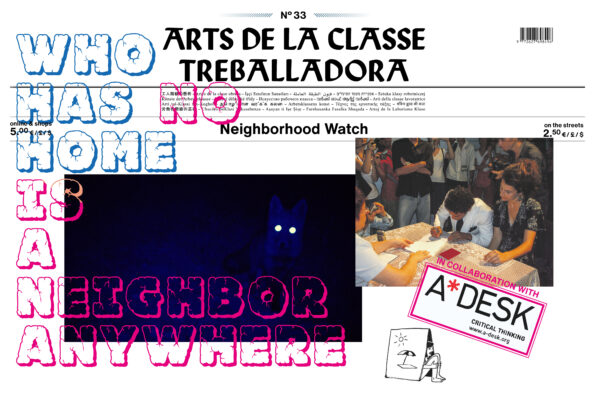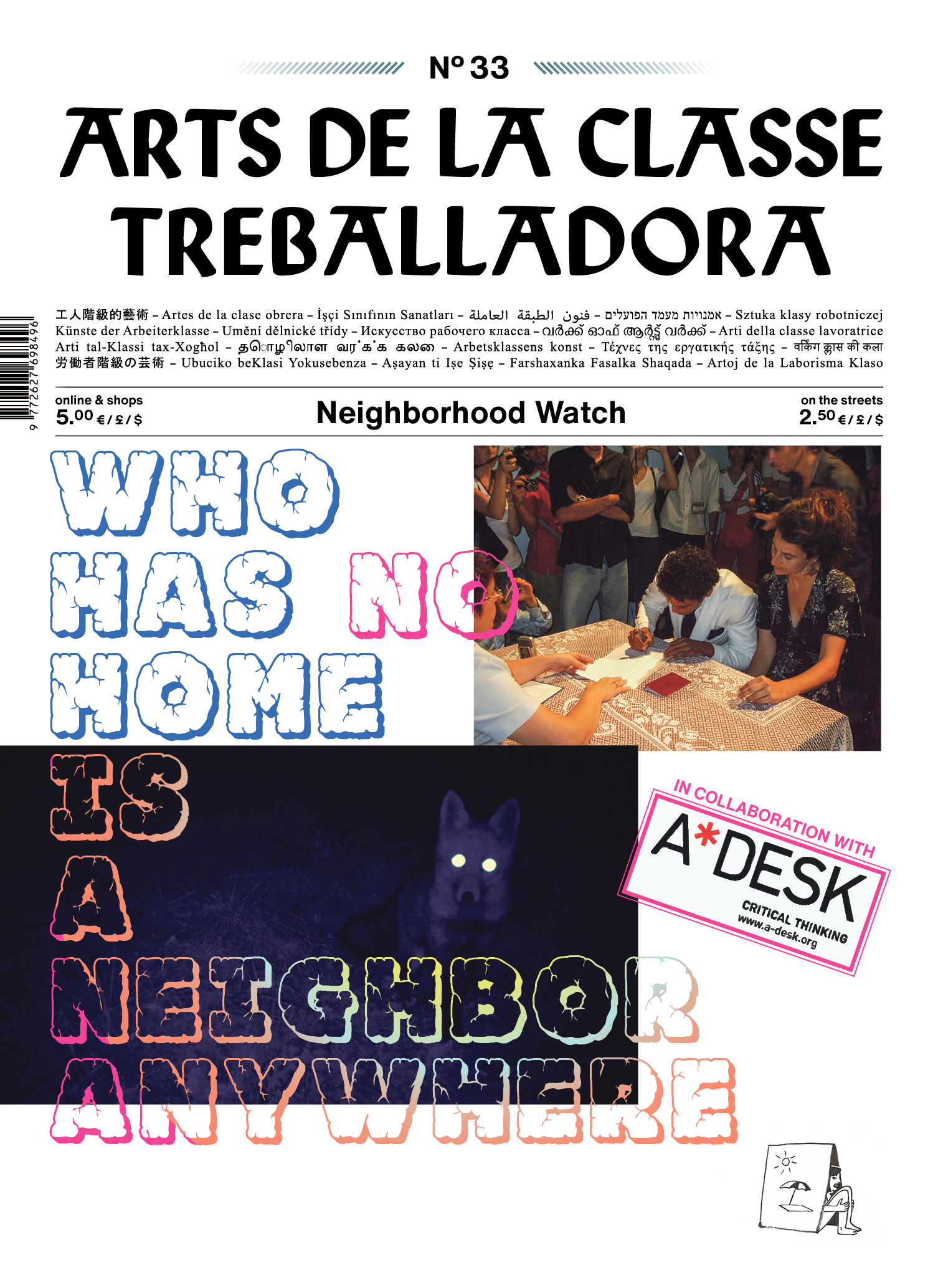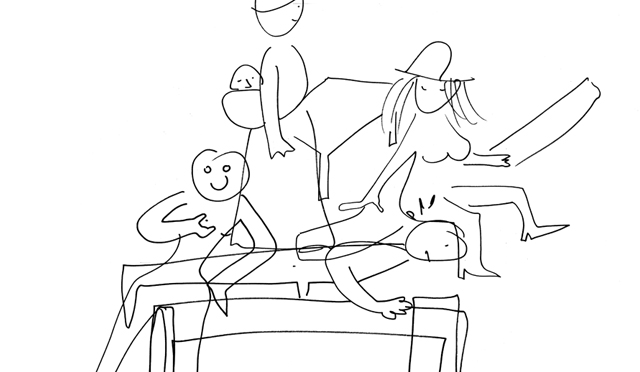Search
To search for an exact match, type the word or phrase you want in quotation marks.
A*DESK has been offering since 2002 contents about criticism and contemporary art. A*DESK has become consolidated thanks to all those who have believed in the project, all those who have followed us, debating, participating and collaborating. Many people have collaborated with A*DESK, and continue to do so. Their efforts, knowledge and belief in the project are what make it grow internationally. At A*DESK we have also generated work for over one hundred professionals in culture, from small collaborations with reviews and classes, to more prolonged and intense collaborations.
At A*DESK we believe in the need for free and universal access to culture and knowledge. We want to carry on being independent, remaining open to more ideas and opinions. If you believe in A*DESK, we need your backing to be able to continue. You can now participate in the project by supporting it. You can choose how much you want to contribute to the project.
You can decide how much you want to bring to the project.

A*DESK has been guest editor of the 33rd issue of Arts of the Working Class magazine. A publication that has become a reference for those seeking to understand the complexity of contemporary cities. The publication will be presented at ADN Galería on Friday, September 6, 18:30-20 hours.
This issue, created in dialogue with María Inés Lazo, Pauł Sochacki and Dalia Maini, revolves around a deep reflection on how the intersectional struggles of communities, both local and global, intertwine and shape our everyday lives. Entitled Neighborhood Watch/Ojos de Barrio, this collaboration between A*DESK and Arts of the Working Class (AWC) is not just a crossover of ideas, but a real challenge to reconsider our roles within the capitalist system and find new ways to connect and support each other. We take advantage of the socio-cultural junctures through Manifesta 15 and Berlin Art Week not only to observe, but to act and contribute to the formation of a more engaged collective consciousness.
Outreach
AWC #33 has a print run of 70,000 copies that will circulate from September 7 to November 7 in Barcelona, at key Manifesta 15 venues such as the former Gustavo Gili headquarters and the Three Chimneys, as well as at the Free Music School, ADN Galeria and Barcelona Gallery Weekend. It will also be present at Berlin Art Week (September 11-15) and at the Paris Internationale fair.
Multilingual
In line with A*DESK, AWC is multilingual. This edition of the Tower of Babel features the addition of Catalan, with the remaining languages being Spanish, German, English, Arabic and French.
About Arts of the Working Class
Since 2018, the traveling journal Arts of the Working Class creates sustainable connections between artists, scholars, urban planners, art institutions from different countries and languages, and vulnerable members of society. It presents artistic, literary and essayistic contributions characterized mainly by plurality: of languages, formats, participants (established and lesser-known artists, street vendors and poets), and forms of access.
This is how AWC becomes a kaleidoscopic and polyglot collage of perspectives, insisting on openness and inconclusiveness, overcoming the dichotomies of norm and deviation. AWC is distributed in bookstores in various cities around the world and also by street vendors, people with few resources who can keep 100% of the income. Distribution fosters new contacts between people, information flows and redistribution of cultural capital. The collective behind AWC also facilitates exhibitions and events related to the content of its editions and its partner publishers.
The theme of issue 33 is NEIGHBORHOOD WATCH.
Gentrification is everywhere, and with it, the struggle against it and against alienation. Our communities influence how we position ourselves in the world and the privileges we access. This issue of AWC, dedicated to the “eyes of the neighborhood,” makes visible the relationship between the local and the global, questioning our actions and impacts in a world where cities act as multinationals.
Content
Guest artists, letters and interviews
We have selected a diverse group of artists for this issue, focused on the theme of communities, neighborhoods, neighbors, cities and the connection between the local and the global, under the concept “Eyes of the Neighborhood”. These artists are: Jeremy Deller, Alba Feito, Carlos Casas, Núria Güell, Ro Caminal, Fito Conesa, Jokkoo Collective and Miralda. We also have letters from workers with contributions from Daniel Gasol, Federico F. Giordano, Faltas, and an interview with the Sindicat de Llogaters.
Chapter 1: LOCAL
In this chapter we explore how socio-cultural, historical and geographical contexts influence the concept of locality. Diana Padrón argues for repoliticizing the creative class to build more inclusive communities, while Glòria Guirao Soro analyzes the precariousness of art in Spain and the emigration of artists to Berlin after the 2008 crisis. Carlos Delclós looks at localism in Barcelona, and the conversation between Helios F. Garcés and Nancy Garín emphasizes the need to decolonize institutions and territories to achieve a more just society.
Chapter 2: GLOBAL
This chapter explores how nations and territories influence our identities and interrelate. Constanza Mendoza addresses the creation of collectivities that sustain life and generate hope, while the Iconoclasistas collective criticizes European states for justifying colonization through a supposed moral superiority, proposing relational maps that reveal the connections between environments and inhabitants. Anna Passlick shows urban micro-relationships in a vignette, and Carolina Campos explores artistic composition, especially in dance, as a process of attention that creates unique worlds. Inés Plasencia argues for overcoming national identities anchored in the past and for a future where recognition is inclusive and without pedestals.
A journey to grounding: Artists at the Berlin Art Week
From Berlin to Barcelona, the artistic community is a testament to transnational solidarity and cultural exchange, where the creation and sharing of art act as forms of resistance and affirmation of identity in a world marked by mobility. Despite displacement, museums and cultural institutions offer stability and a sense of community, embodying cultural resilience and providing a home for global artists. We selected 15 artists from diverse communities to share their stories and reflect on their backgrounds, showing how art can overcome borders, foster understanding and build inclusive communities.


A*DESK is a critical platform focused on publishing, training, experimentation, communication and dissemination in relation to contemporary culture and art, which is defined by transversality. The starting point is contemporary art, because that is where we come from and this awareness allows us to go much further, to incorporate other disciplines and forms of thought in order debate issues that are relevant and urgent for understanding our present.
"A desk is a dangerous place from which to watch the world" (John Le Carré)